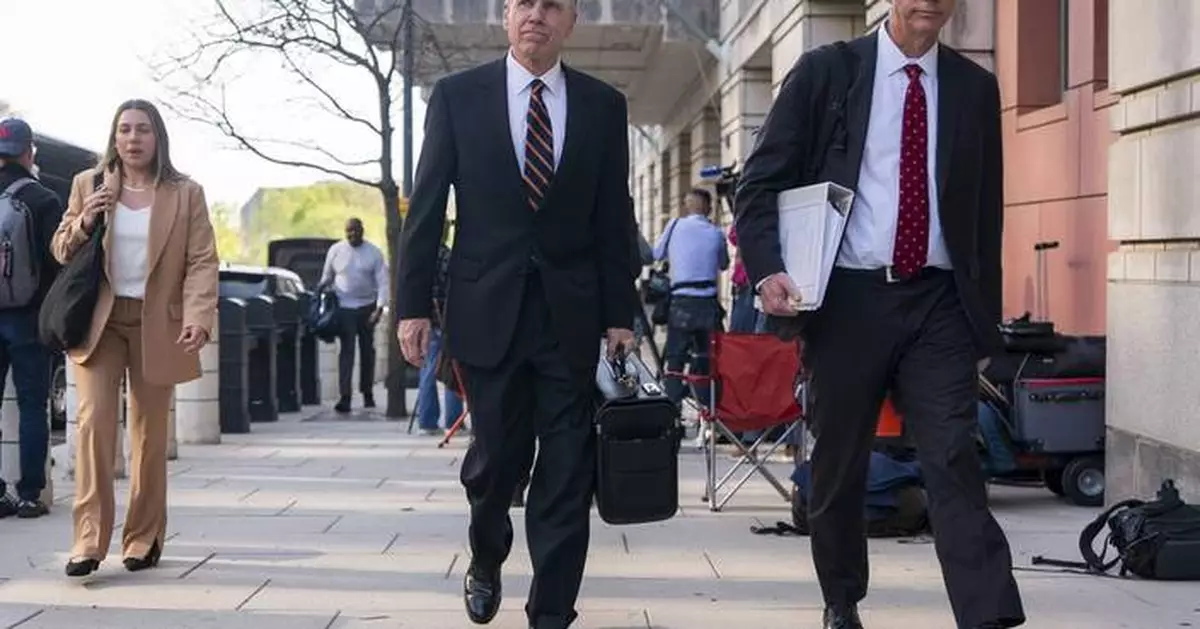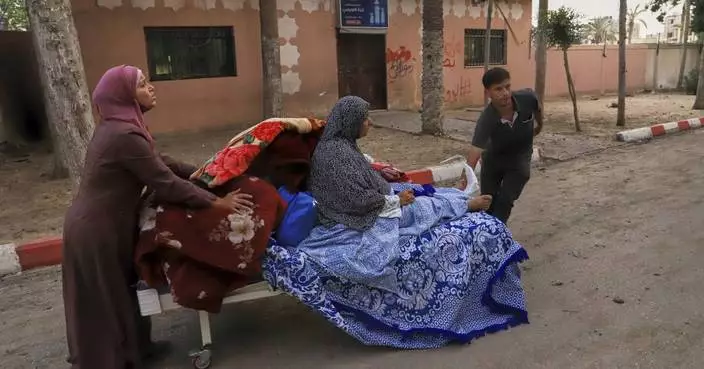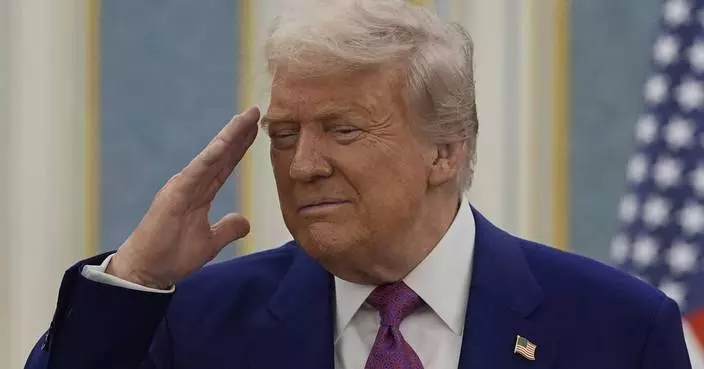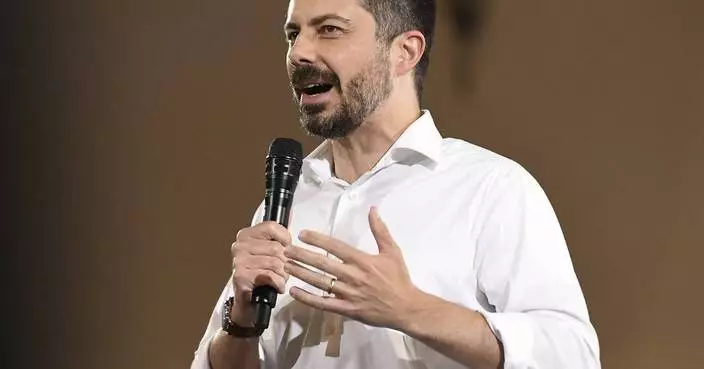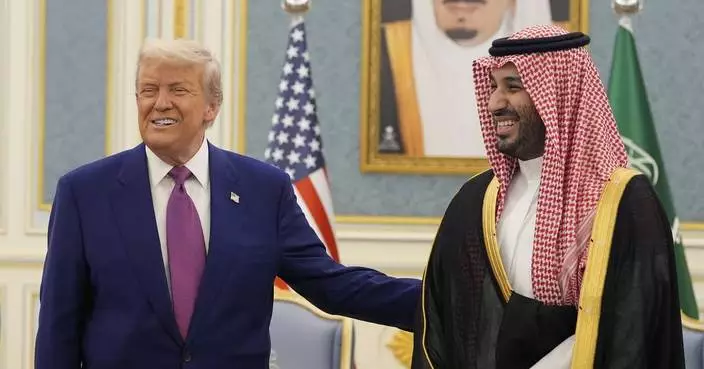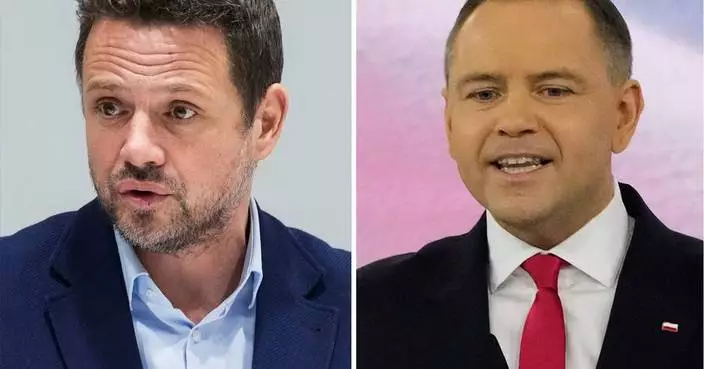WASHINGTON (AP) — Meta CEO Mark Zuckerberg emphasized in federal court on Wednesday that he bought Instagram and WhatsApp because he saw value in the companies — not to take out competitors, as the Federal Trade Commission alleges in a historic antitrust trial.
Zuckerberg took the stand for the third day in the trial, wrapping up his testimony as the first witness Wednesday afternoon. He took questions from Meta attorney Mark Hansen, who has argued that his client hardly has a monopoly in social media, as the FTC claims, and still faces stiff global competition.
Hansen focused some of his questioning on emails sent by Zuckerberg and his associates that the FTC cited in earlier testimony to illustrate the Facebook founder's alarm over the growth of Instagram and his sense that he needed to neutralize its threat.
Zuckerberg said he’s very focused on inventing new things, and understanding what other people are creating is a big part of the process. At any given point in his company’s history, he said, similar tones of concern could be found in emails about what other companies were doing better than his.
“This is my job," Zuckerberg said. "I need to understand what is going on, and I need to push our teams to move quickly” to learn about what is going on in a very competitive market.
Hansen questioned Zuckerberg about competition, particularly from TikTok, the popular social media site owned by Beijing-based company ByteDance, and the the growth of the video-sharing platform YouTube, which is owned by Alphabet.
Zuckerberg testified that people spend more time on YouTube than on Facebook and Instagram combined.
While Hansen noted that the FTC doesn't consider YouTube to be a Meta competitor — because it doesn't have the same friend-sharing technology as Facebook — Zuckerberg said YouTube has built in ways to share videos.
The FTC contends Meta has used a monopoly in its technology that facilitates connecting with friends and family to generate enormous profits as consumer satisfaction has dropped. The case could force the tech giant to break off Instagram and WhatsApp, startups it bought more than a decade ago that have since grown into social media powerhouses.
Daniel Matheson, the FTC's attorney who questioned Zuckerberg, has repeatedly brought up his own words in emails to associates before and after the acquisition of Instagram to try to show Zuckerberg was more interested halting Instagram's alarming growth than improving the product.
Under questioning by Hansen, Zuckerberg insisted that he had no intention of acquiring Instagram only to slow its development and end a threat. He said the focus was on "having it run as an independent brand.”
Hansen noted that the FTC is making similar claims about the acquisition of the messaging app WhatsApp: that Zuckerberg was afraid of the company's potential.
“It’s something I thought about," Zuckerberg said, noting the app's formidable capabilities, but he added that he later learned not to be worried because the owners didn't share the same vision or direction.
He said his interest in buying it was “the usage of it.”
“I thought the app was important and valuable,” Zuckerberg said.
The trial, which is slated to last weeks, will feature other Big-Tech figures. After Zuckerberg, Sheryl Sandberg, Facebook's former chief operating officer, took the stand.
The trial is one of the first big tests of President Donald Trump’s FTC’s ability to challenge Big Tech. The lawsuit was filed against Meta — then called Facebook — in 2020, during Trump’s first term. It claims the company bought Instagram and WhatsApp to squash competition and establish an illegal monopoly in the social media market.
Facebook bought Instagram — which was a photo-sharing app with no ads — for $1 billion in 2012.
Instagram was the first company Facebook bought and kept running as a separate app. Until then, Facebook was known for smaller “acqui-hires” — a popular Silicon Valley deal in which a company purchases a startup as a way to hire its talented workers, then shuts the acquired company down. Two years later, it did it again with the messaging app WhatsApp, which it purchased for $22 billion.
WhatsApp and Instagram helped Facebook move its business from desktop computers to mobile devices, and to remain popular with younger generations as rivals like Snapchat (which it also tried, but failed, to buy) and TikTok emerged.
U.S. District Judge James Boasberg is presiding over the case. Late last year, he denied Meta’s request for a summary judgment and ruled that the case must go to trial.
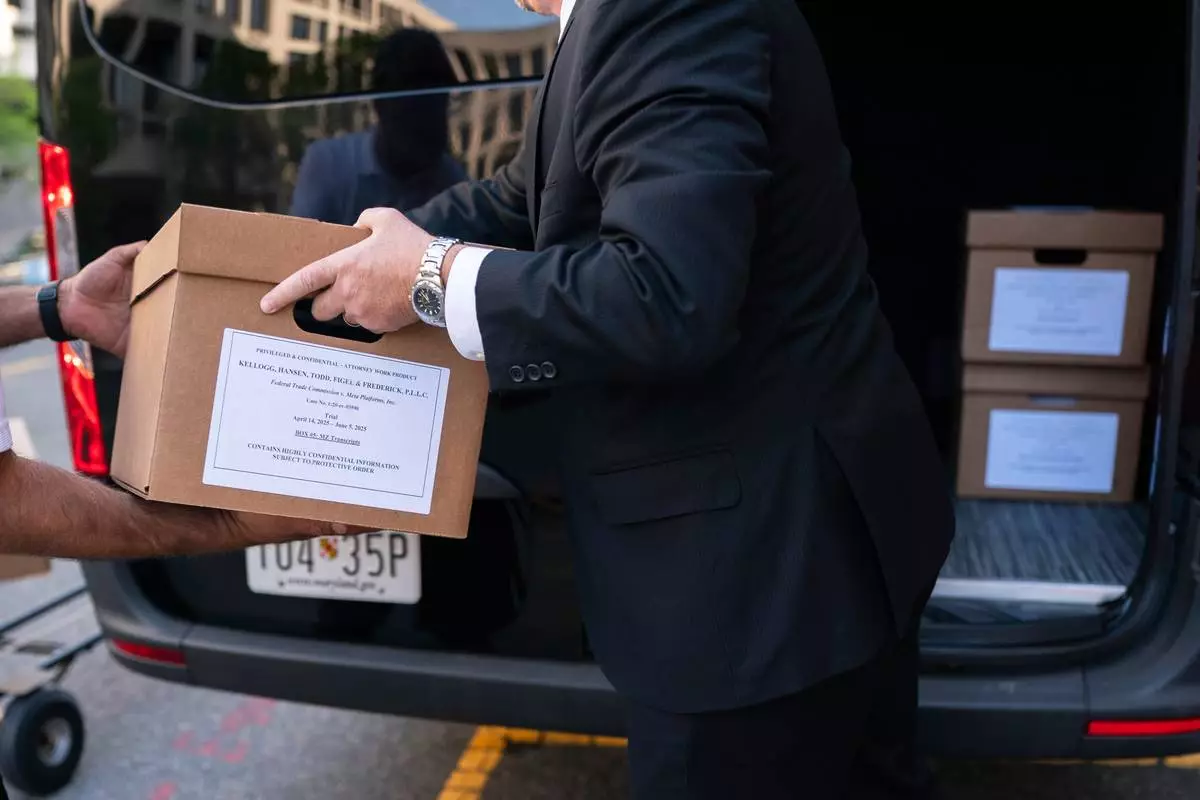
Workers load boxes of documents into a vehicle following the first day of a historic antitrust trial about Meta CEO Mark Zuckerberg's intentions in acquiring Instagram, at Barrett Prettyman United States Court House in Washington, Monday, April 14, 2025. (AP Photo/Nathan Howard)
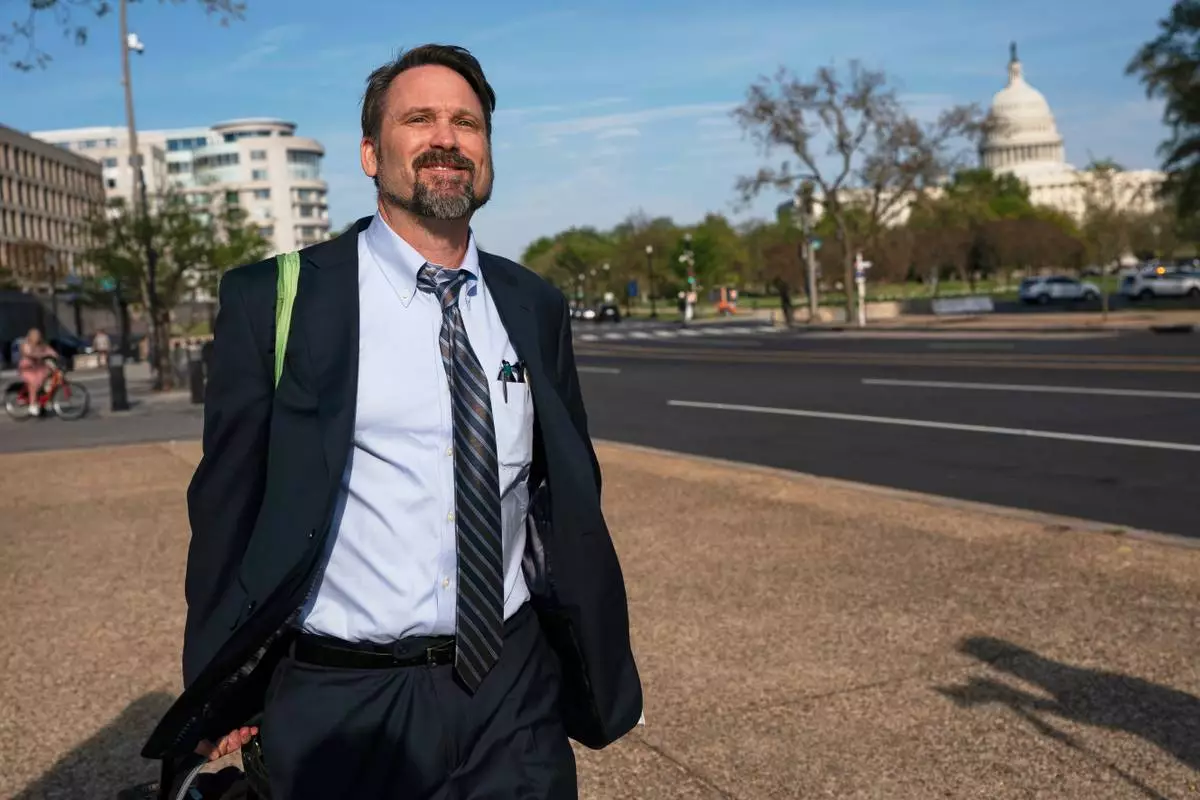
Daniel Matheson, a lawyer for the Federal Trade Commission, departs following the first day of a historic antitrust trial about Meta CEO Mark Zuckerberg's intentions in acquiring Instagram, at Barrett Prettyman United States Court House in Washington, Monday, April 14, 2025. (AP Photo/Nathan Howard)
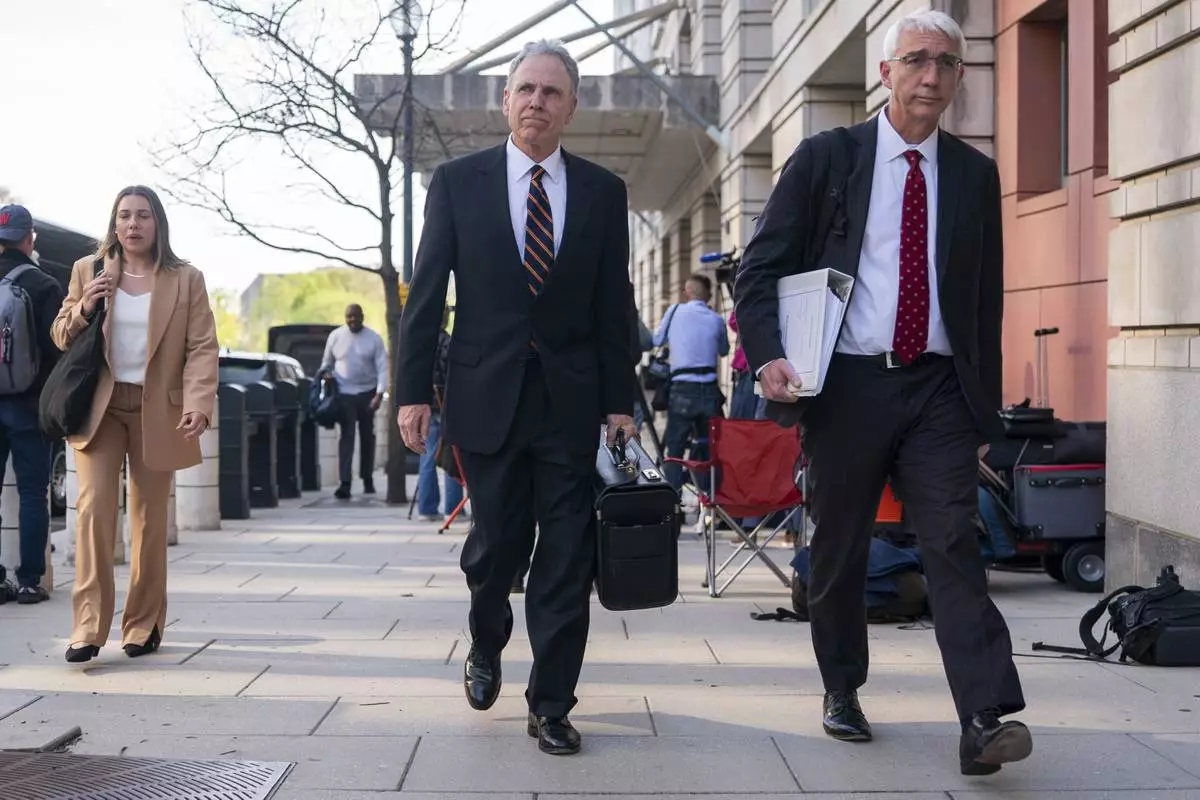
Mark Hansen, center, a lawyer for Meta, departs following the first day of a historic antitrust trial about Meta CEO Mark Zuckerberg intentions in acquiring Instagram, at Barrett Prettyman United States Court House in Washington, Monday, April 14, 2025. (AP Photo/Nathan Howard)
RIYADH, Saudi Arabia (AP) — U.S. President Donald Trump met Wednesday with Syria’s interim President Ahmad al-Sharaa, the first such encounter between the two nations’ leaders in 25 years.
The meeting, on the sidelines of Trump sitting with the leaders of the Gulf Cooperation Council, marks a major turn of events for a Syria still adjusting to life after the over 50-year, iron-gripped rule of the Assad family. People across Syria cheered in the streets and shot off fireworks Tuesday night to celebrate, hopeful their nation locked out of credit cards and global finance might rejoin the world's economy when they need investment the most.
It’s also remarkable given al-Sharaa, under the nom de guerre Abu Mohammed al-Golani, has ties to al-Qaida and joined insurgents battling U.S. forces in Iraq before entering the Syrian war. It follows Trump, long a critic of America's once-called “forever wars” in the Mideast after the Sept. 11, 2001, attacks, offered an anti-interventionist speech before the Saudi public as well.
Trump on Tuesday announced the meeting, saying the U.S. also would move to lift economic sanctions on Syria as well. Syria even before its ruinous civil war that began in 2011 struggled under a tightly controlled socialist economy and under sanctions by the U.S. as being a state-sponsor of terror since 1979.
The meeting took place behind closed doors and reporters were not permitted to witness the engagement. The White House did not immediately say who else was in the meeting or provide any other details on the conversation.
Trump said he was looking to give Syria, which is emerging from more than a decade of brutal civil war “a chance at peace” under al-Sharaa
Al-Sharaa was named interim president of Syria in January, a month after a stunning offensive by insurgent groups led by al-Sharaa’s Hayat Tahrir al-Sham, or HTS, that stormed Damascus, ending the 54-year rule of the Assad family.
The United States has been weighing how to handle al-Sharaa since he took power in December.
Many Gulf Arab leaders have rallied behind the new government in Damascus and want Trump to follow, believing it is a bulwark against Iran’s return to influence in Syria, where it had helped prop up Assad’s government during a decadelong civil war.
But longtime U.S. ally Israel has been deeply skeptical of al-Sharaa’s extremist past and cautioned against swift recognition of the new government. However, Trump cited the intervention of Saudi Crown Prince Mohammed bin Salman as key to his decision.
The White House earlier signaled that the Trump and al-Sharaa engagement, on the sidelines of a Gulf Cooperation Council meeting in Riyadh convened as part of Trump’s four-day visit to the region, would be brief, with the administration saying the U.S. president had “agreed to say hello” to the Syrian president on Wednesday.
Al-Sharaa is the first Syrian leader to meet an American president since Hafez Assad met Bill Clinton in Geneva in 2000.
Syrians cheered the announcement by Trump that the U.S. will move to lift sanctions on the beleaguered Middle Eastern nation.
The state-run SANA news agency published video and photographs of Syrians cheering in Umayyad Square, the largest in the country’s capital, Damascus. Others honked their car horns or waved the new Syrian flag in celebration.
People whistled and cheered the news as fireworks lit the night sky.
A statement from Syria’s Foreign Ministry issued Tuesday night called the announcement “a pivotal turning point for the Syrian people as we seek to emerge from a long and painful chapter of war.”
The statement also was careful to describe the sanctions as coming “in response to the war crimes committed by the Assad regime against the Syrian people,” rather than the war-torn nation’s new interim government.
“The removal of these sanctions offers a vital opportunity for Syria to pursue stability, self-sufficiency and meaningful national reconstruction, led by and for the Syrian people,” the statement added.
Associated Press photographer Alex Brandon contributed to this report. Madhani reported from Dubai, United Arab Emirates.

Syrians wave Saudi and Syrian flags in celebration after U.S. President Donald Trump announced plans during his visit to Saudi Arabia to ease sanctions on Syria and normalize relations with its new government, in Homs, Syria, late Tuesday, May 13, 2025.(AP Photo/Omar Albam)
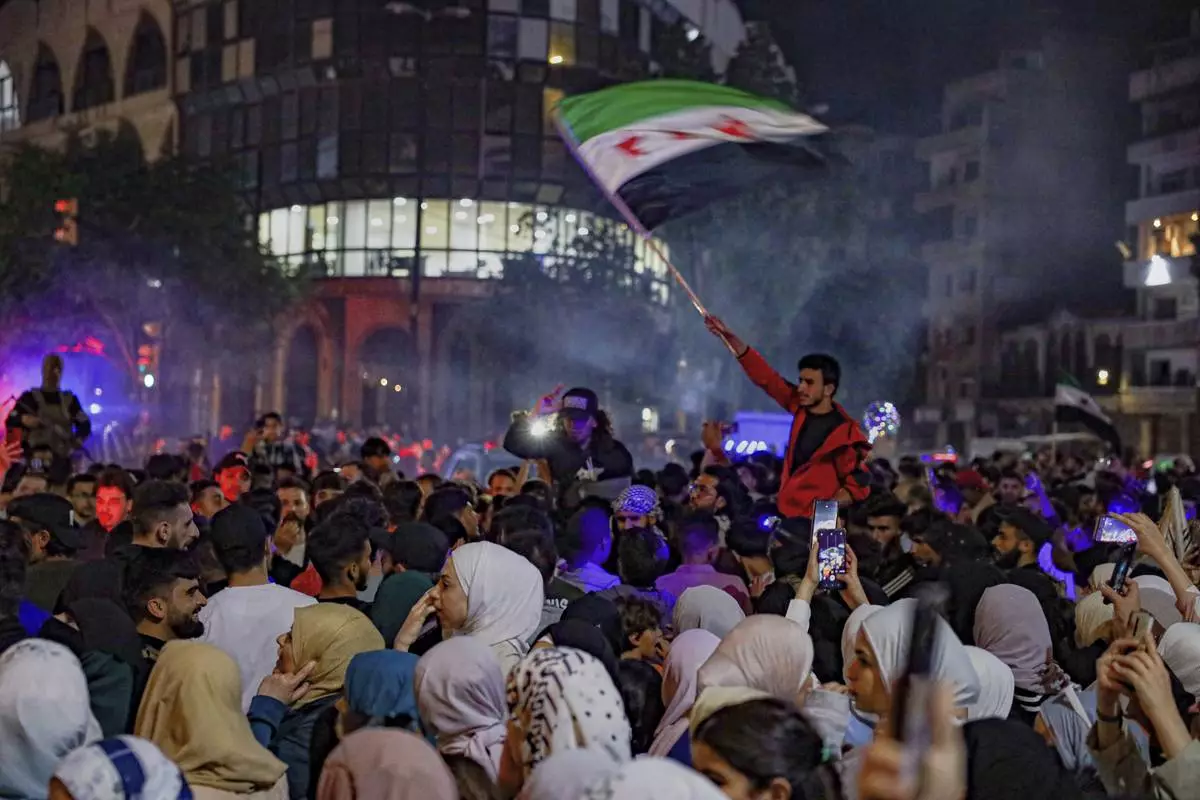
Syrians celebrate after U.S. President Donald Trump announced plans during his visit to Saudi Arabia to ease sanctions on Syria and normalize relations with its new government, in Homs, Syria, late Tuesday, May 13, 2025.(AP Photo/Omar Albam)
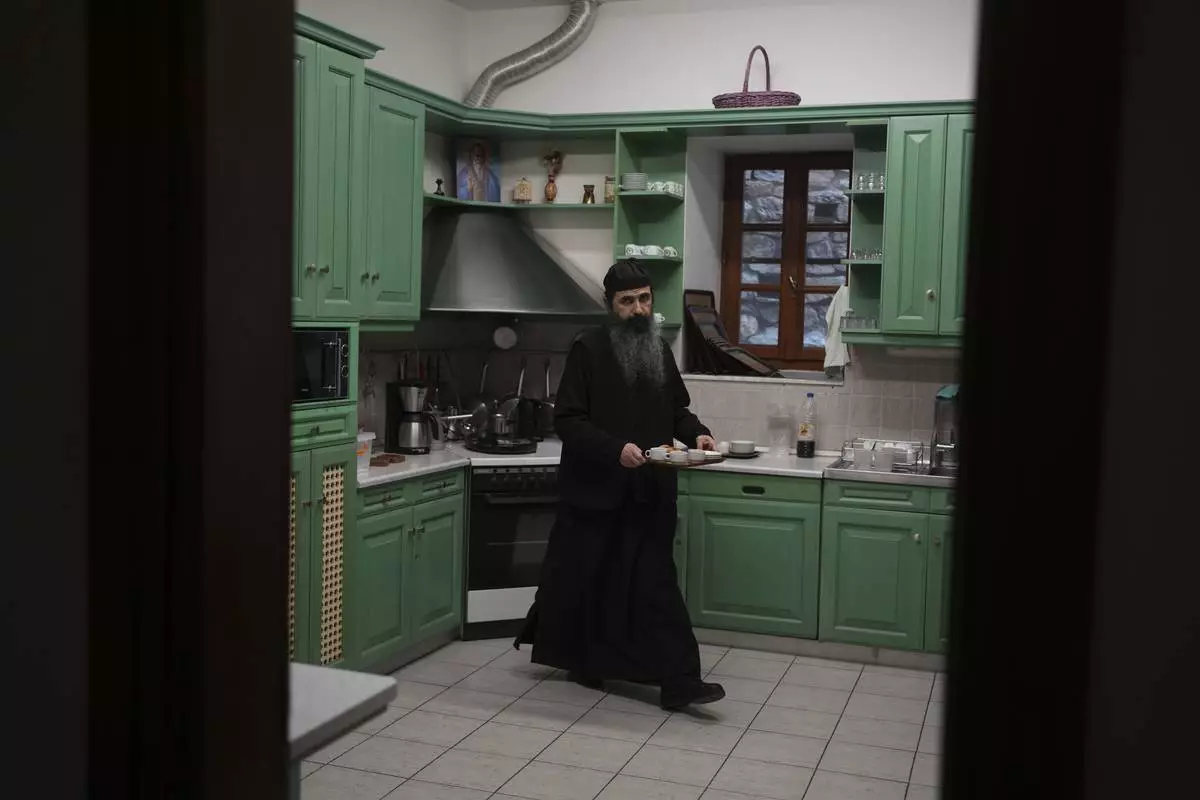
Father Serafeim, a Lebanese-Syrian, prepares coffee in the kitchen of Simonopetra, or the Simonos Petra Monastery, home of the all-male autonomous community Agion Oros, or Holy Mountain, on the peninsula of Mount Athos in northern Greece, Monday, April 14, 2025. (AP Photo/Thanassis Stavrakis)

Syrians celebrate in Umayyad Square after U.S. President Donald Trump announced plans to ease sanctions on Syria and move toward normalizing relations with its new government to give the country 'a chance at peace,' in Damascus, Syria, Tuesday, May 13, 2025. (AP Photo/Omar Sanadiki)

Syrians celebrate after U.S. President Donald Trump announced plans to ease sanctions on Syria and move toward normalizing relations with its new government to give the country 'a chance at peace,' in Idlib, Syria, Tuesday, May 13, 2025. (AP Photo/Ghaith Alsayed)
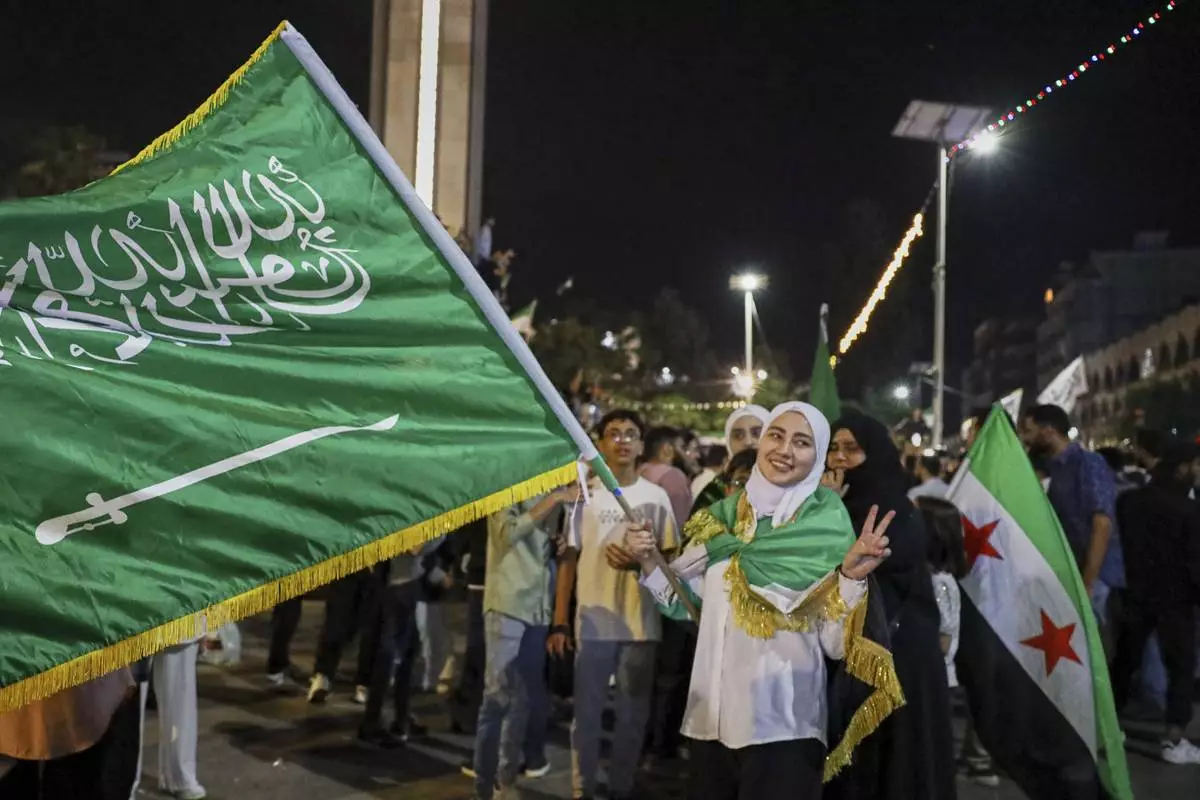
A girl holds a Saudi flag in celebration after U.S. President Donald Trump announced plans during his visit to Saudi Arabia to ease sanctions on Syria and normalize relations with its new government, in Homs, Syria, late Tuesday, May 13, 2025.(AP Photo/Omar Albam)
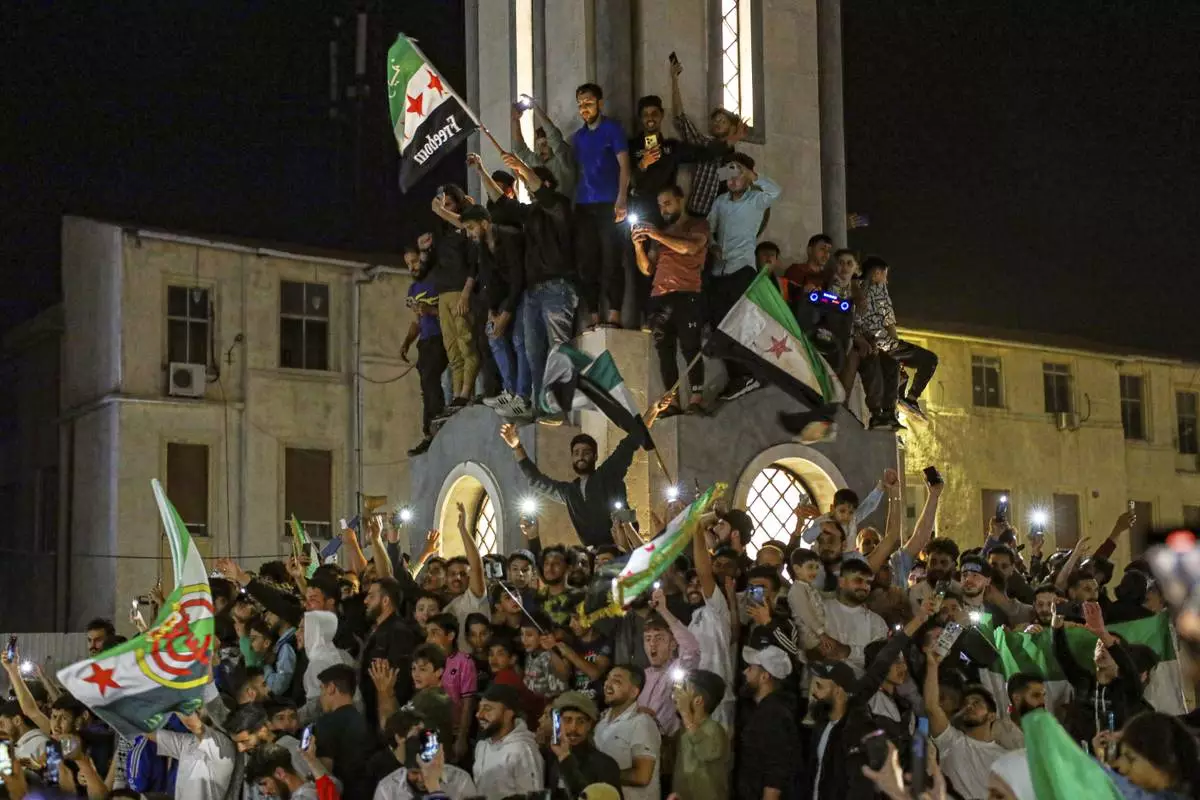
Syrians celebrate after U.S. President Donald Trump announced plans during his visit to Saudi Arabia to ease sanctions on Syria and normalize relations with its new government, in Homs, Syria, late Tuesday, May 13, 2025.(AP Photo/Omar Albam)
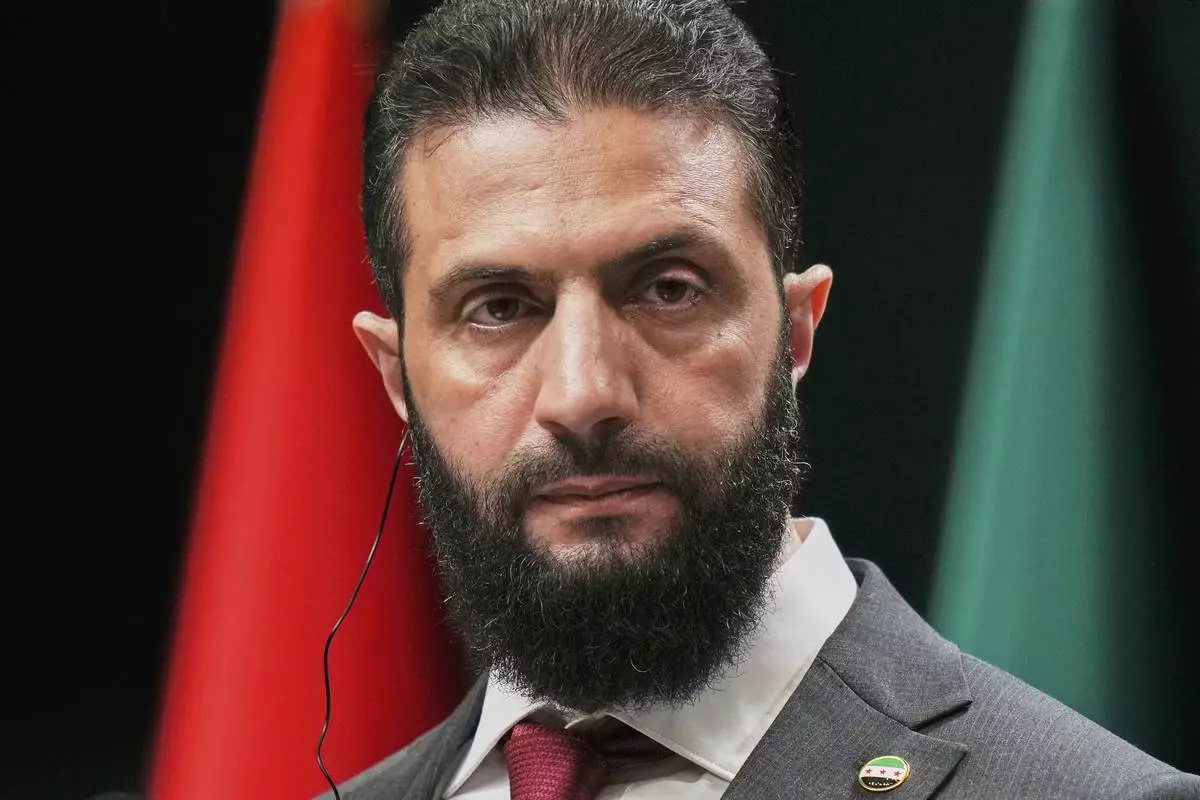
FILE - Syria's interim President Ahmad al-Sharaa, looks on during a joint press conference with Turkish President Recep Tayyip Erdogan at the presidential palace in Ankara, Turkey, Feb. 4, 2025. (AP Photo/Francisco Seco, File)
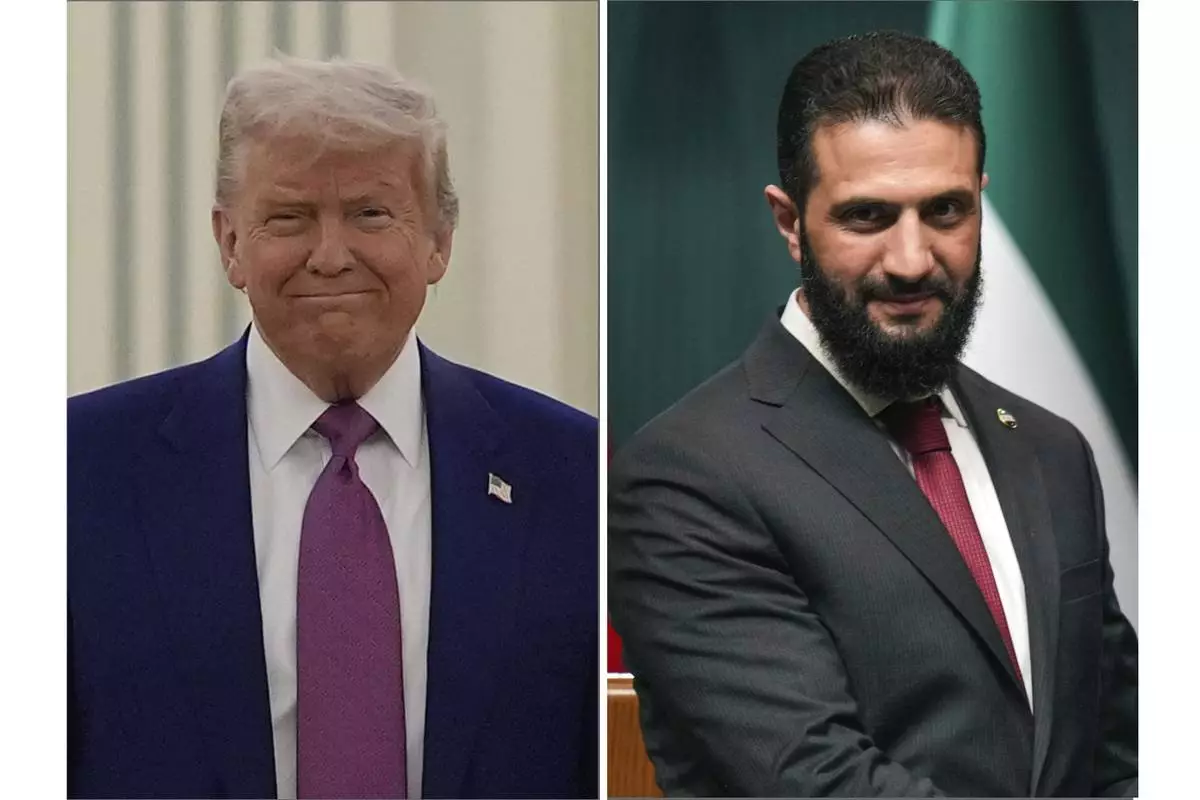
This combination of photos shows U.S. President Donald Trump, left, in Riyadh, Saudi Arabia, on May 13, 2025 and Syria's President Ahmad al-Sharaa in Ankara, Turkey, on Feb. 4, 2025. (AP Photo/Francisco Seco, File) (AP Photo, File)





